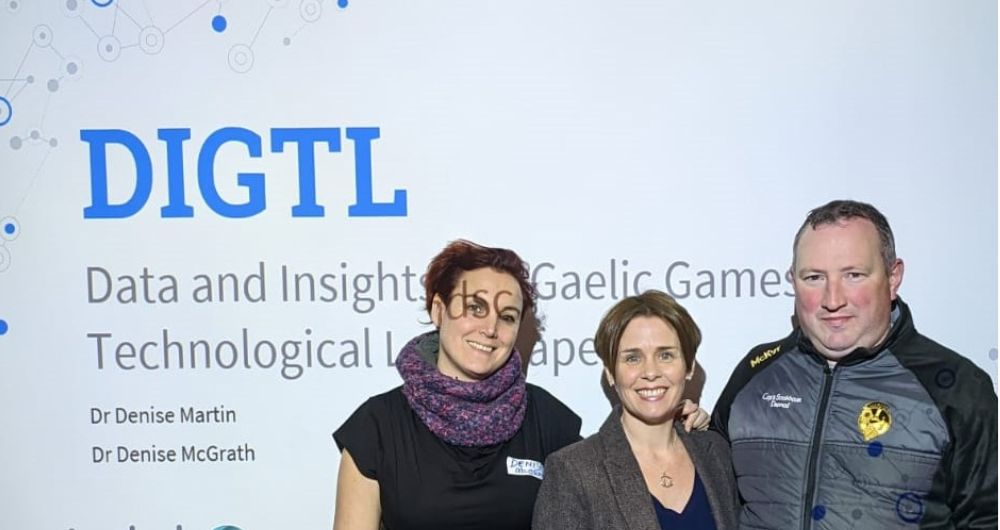
Pictured L-R: Dr Denise McGrath, Insight, Dr Denise Martin, TU Dublin and Padraig McGourty, Atlantic Technological University.
The “GAELIC DIGTL (Data and Insights in a Gaelic Games Technological Landscape)” project team is led by Dr Denise McGrath (Insight), joined by colleagues from TU Dublin, Dr Denise Martin and Dr Kieran Collins; Padraig McGourty from Atlantic Technological University, Prof David Hassan from Ulster University, fellow Insight colleagues Prof Mark Roantree and Dr Ciara Duignan and Dr Peter Horgan from the GAA. This project sought to understand what steps the three Gaelic Games Associations i.e. the GAA, the Camogie Association and the Ladies Gaelic Football Association, could undertake to optimise data and technology for their strategic needs, particularly in the context of closer integration of the associations. Digital Transformation offers sporting organisations the ability to streamline operations, reduce burden on volunteers and enhance commercial opportunities. Engaging in Digital Transformation requires a common vision that each person/department in the organisation is aware of and is enabled to work towards.
Dr Denise McGrath writes:
Our project began early in 2022, at a time when the Associations were emerging from consecutive seasons in which games and revenues had been demolished by the Covid-19 pandemic, but equally, through which the Associations thrived in terms of pivoting to digital platforms and cementing their positions in the fabric of society. The fundamental shift in how the world operated during the pandemic enabled a series of innovations across the Associations that will act as a springboard for their digital futures. Our work consisted of a comprehensive stakeholder engagement process involving executives across the Associations This culminated in a stakeholder workshop in December 2022 in Croke Park, which brought 30 individuals together to discuss possible research avenues going forward, as well as a vision and objectives for a future-proofed data strategy.
It was clear from our engagements that the Gaelic Games Associations are steadily embracing Digital Transformation, albeit in a somewhat fragmented, siloed way. Key challenges identified included employee workload that precludes conversations about strategic data needs, and volunteer burden with respect to data collection and data literacy, giving rise to buy-in challenges when there is no immediate benefit to the smaller units of the associations. This compounded concerns around insufficient volunteer numbers to meet the growing demands of the games, particularly in the ladies’ games. Our work highlighted potential opportunities for efficiencies and improved data governance.
Existing research partnerships have enabled the three Associations to connect academics and academic institutions to their organisations to commission high-quality evidence that informs their policies and practices. We identified that the Associations now have an opportunity to become leaders in “Open Science” in sport in Ireland, starting with the creation of an open, central database that could enrich interdisciplinary partnerships, avoid duplication of research efforts and optimise the dissemination of research findings. We additionally proposed a research roadmap, part of which is currently being implemented by Insight researcher Aidan Boran, who was previously seconded to
the HSE in 2022 to survey the data integration and analytics infrastructure and to develop processes to optimise future collaborative research. Aidan is now seconded to the GAA for a 6-month period.
Above all, the success of this project has been established in how it brought people together from disparate areas of the Gaelic Games landscape and facilitated new conversations about their shared digital future.